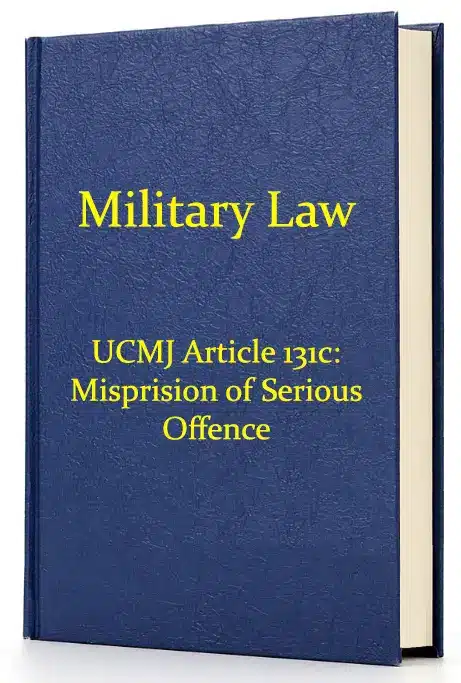Article 131c of the Manual for Courts-Martial states any service member may be subject to prosecution if they know that another person has committed a serious offense. They wrongfully conceal the commission of the offense and fail to make the commission of the offense known to civilian or military authorities as soon as possible.
To be convicted, the prosecution must demonstrate that:
-
a particular person committed a severe specific offense;
-
the accused knew that the said person had committed a grave offense and
-
after that, the accused wrongfully concealed the serious offense and failed to make it known to civilian or military authorities as soon as possible.
Understanding Article 131c (Misprision of Serious Offense) of the UCMJ
Misprison of a severe offense is concealing a powerful offense committed by another but without such previous contact with or subsequent assistance to the principal as would make the accused an accessory. Just to let you know, an intent to benefit the principal is unnecessary for this offense.
For Article 131c, a severe offense is any offense punishable under the UCMJ’s authority by death or confinement for a term exceeding one year.
A mere failure or refusal to disclose the severe offense without some positive act of concealment does not make one guilty of this offense.
Maximum Possible Punishment for Violations of Article 131c
Service members convicted of violating Article 131c of the UCMJ face the maximum possible punishment of a dishonorable discharge, forfeiture of all pay and allowances, and three years’ confinement.
How do you defend against Article 131c Misprision of Serious Offense charges?
When facing the combined resources of the military and the current cultural climate, you need to be prepared to defend your career and your freedom. Crisp and Associates, LLC has a team of experienced trial attorneys with over 75 years of combined experience who have won these cases. This team includes the firm’s founder, Jonathan Crisp, a highly respected and sought-after attorney, speaker, and lecturer who has served in the U.S. Army Judge Advocate General’s Corps (JAG) since 1998 and entered private practice in 2007.
If you, or someone you know, is facing Article 131c charges for Misprision of Serious Offense, you need to speak with a Military defense attorney immediately. We understand what is at risk and know how to protect your career, freedom, and future.




